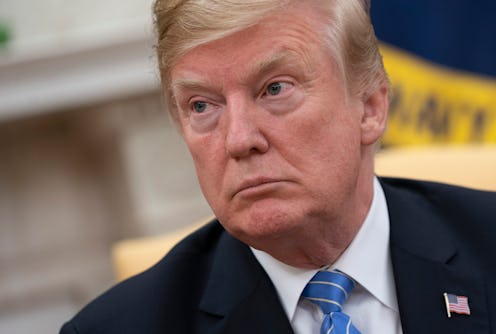News
It Sure Sounds Like Things Aren't Going So Well Between Trump & North Korea RN

Early on Saturday, Secretary of State Mike Pompeo characterized his two-day disarmament talks with North Korea’s Kim Yong-chol as “productive.” The two reportedly had a “relationship building” dinner on Friday, according to The Guardian, and they were even reportedly “cracking jokes.” But later on Saturday morning, North Korean officials issued a scathing review of the Pompeo and North Korea meeting.
The New York Times reported that North Korea called talks with Pompeo “deeply regrettable,” and then accused the Trump administration of advocating for a “unilateral and gangster-like demand for denuclearization.” The paper did not clarify what exactly North Korean officials meant by “gangster-like,” but it did note that the talks weren’t bad enough to completely spoil President Trump’s “friendly relationship and trust” with leader Kim Jong Un, according to North Korea’s Foreign Ministry.
North Korea’s statement on Saturday is perplexing, especially after Pompeo gave a statement to reporters earlier that day just before leaving for Tokyo. “We had many hours of productive conversations,” Pompeo told reporters, according to NBC News. “These are complicated issues but we made progress on almost all of the central issues. Some places a great deal of progress, other places there’s still more work to be done.”
But once Pompeo landed, an unnamed Foreign Ministry official for North Korea issued a statement that described the talks as “gangster-like.” The official also said the outcome of the talks was “very concerning,” and that they have led to a "dangerous phase that might rattle our willingness for denuclearization that had been firm,” according to NBC News. The official accused the U.S. of pressuring North Korea to give up its nuclear weapons “unilaterally,” meaning only North Korea would commit to disarmament, while the U.S. would get to keep its access to weapons.
If the claims are true, then the talks would seem to run contrary to what President Trump and Kim Jong Un agreed to during their historic Singapore summit in June — a “complete denuclearization” of North Korea. Though when Trump and Kim Jong Un signed the agreement in June, neither had outlined what specific actions North Korea or the U.S. would take to reach complete denuclearization — and neither had even attempted to define what “complete” denuclearization was, according to The New York Times.
The goal of Pompeo’s talks with Kim Yong-chul was “to try to get the North Koreans to match their vague commitment to denuclearization with some kind of action,” according to the Times. To do this, Pompeo sought to achieve three things the Times reported:
- The locations of weapons sites
- A timeline of efforts to deconstruct and stop the production of nuclear weapons, including “the destruction of a missile engine testing facility,” the BBC reported.
- A “written statement that the North’s definition of denuclearization matched Mr. Pompeo’s.”
But the Times reported that Pompeo would not disclose to reporters whether he had attained any of those three goals. Pompeo also said he discussed the return of the remains of U.S. service members killed in the Korean War.
The outcome of Pompeo’s talks with North Korea fit the general theme of U.S. attempts to deescalate what appears to be an ever-growing nuclear threat from the country: the meetings appeared promising at first, and then seemed to spiral downhill.
In late June, President Trump attempted to address questions about how the U.S. hopes to keep North Korea and Kim Jong Un accountable for all of the promises made during any of their summit. He also renewed sanctions on North Korea, citing an “extraordinary threat” from the country’s nuclear weapons, according to the BBC. Fitting the general theme yet again, though, the renewed sanctions came just 10 days after Trump had tweeted "There is no longer a Nuclear Threat from North Korea," on June 13, the BBC reported.
It’s unclear how either North Korea or the U.S. will move forward from here. On Sunday, Pompeo will meet with the foreign ministers of Japan and South Korea.